2024年中考人教版英语总复习课件 人际沟通语法专项复习 (共33张PPT)
文档属性
| 名称 | 2024年中考人教版英语总复习课件 人际沟通语法专项复习 (共33张PPT) |

|
|
| 格式 | pptx | ||
| 文件大小 | 373.7KB | ||
| 资源类型 | 教案 | ||
| 版本资源 | 通用版 | ||
| 科目 | 英语 | ||
| 更新时间 | 2024-03-08 21:54:53 | ||
图片预览

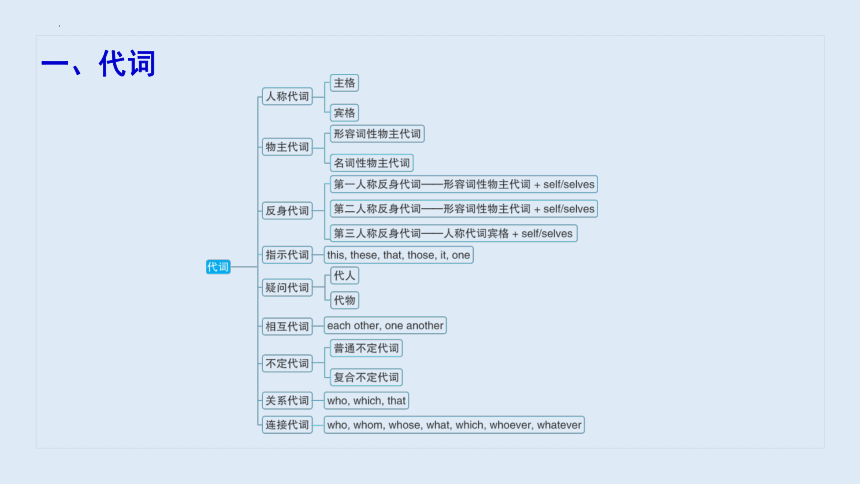
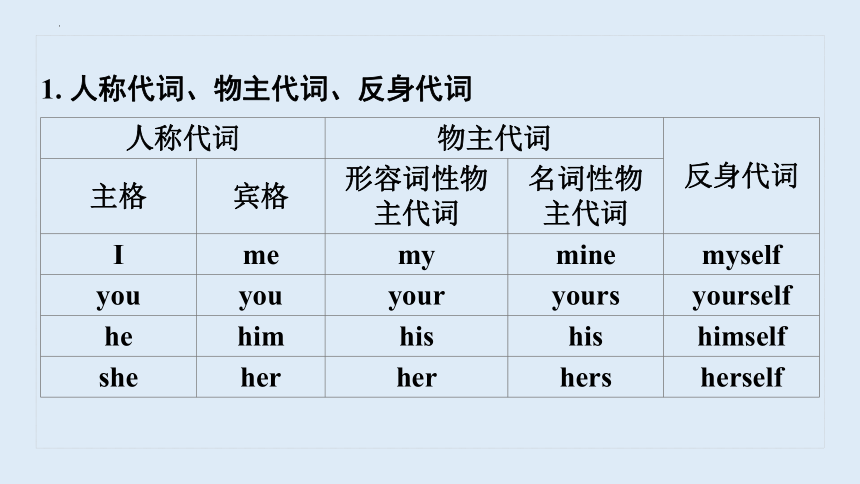
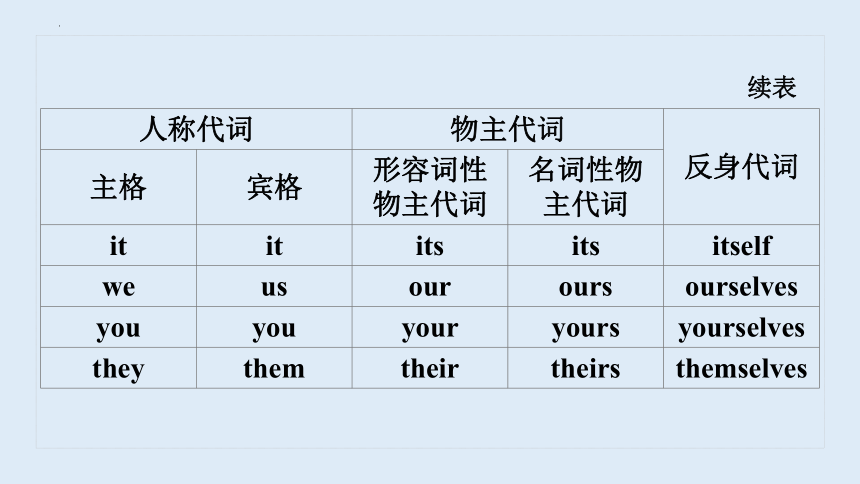
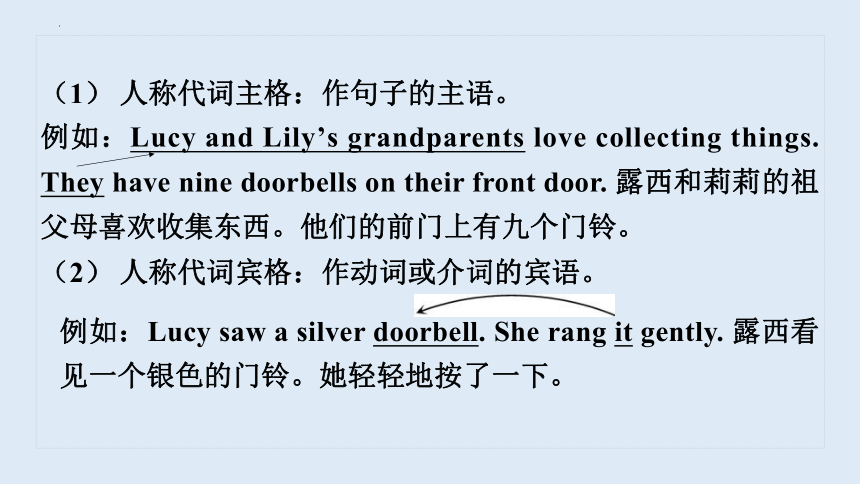
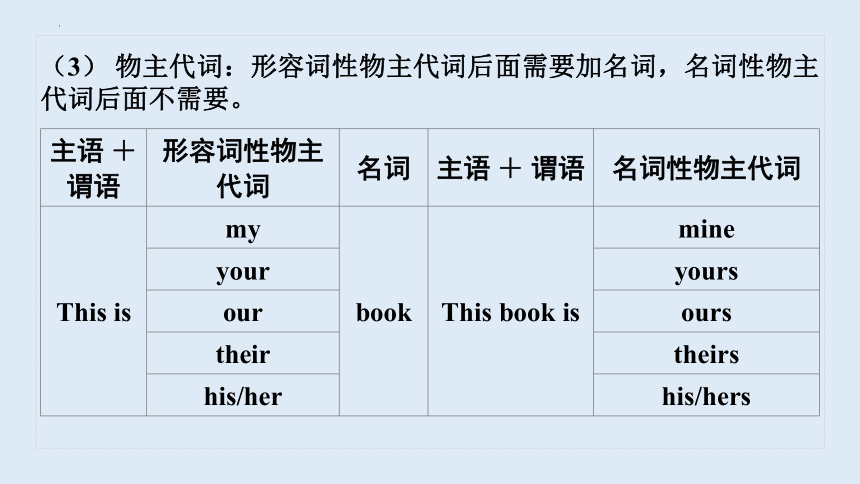
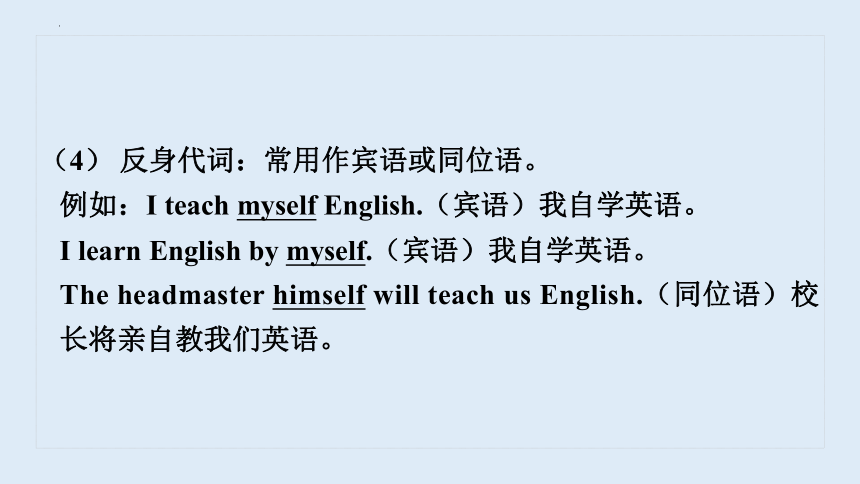
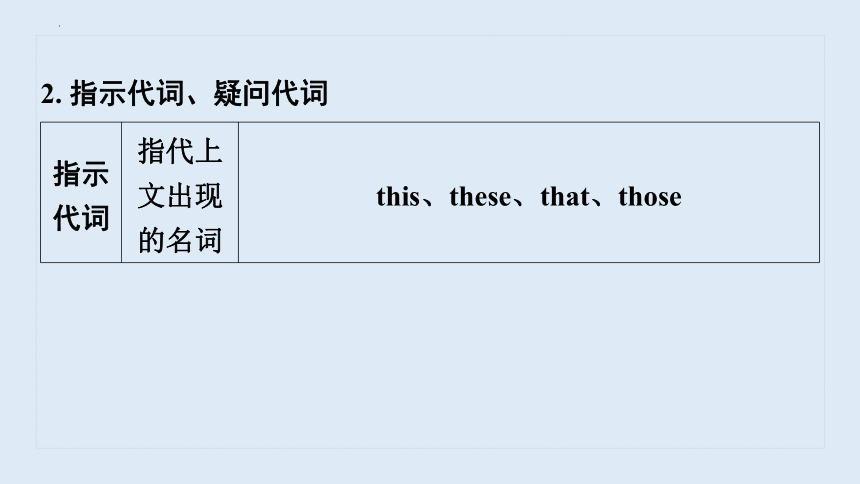
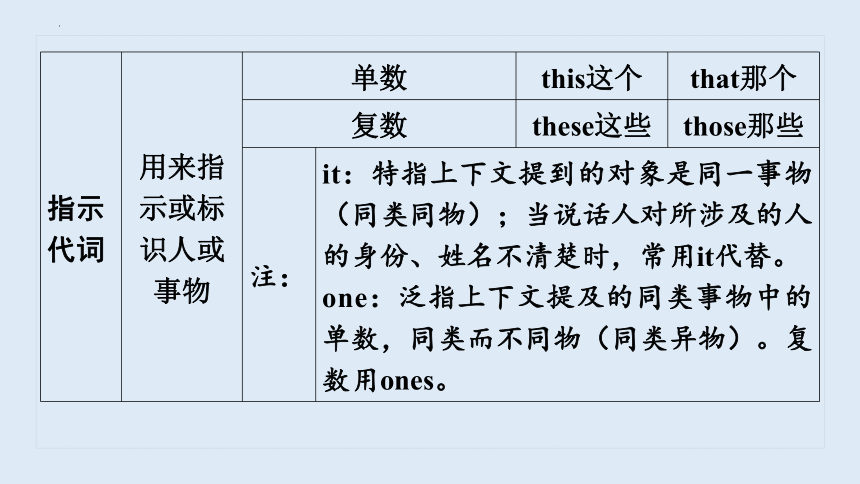
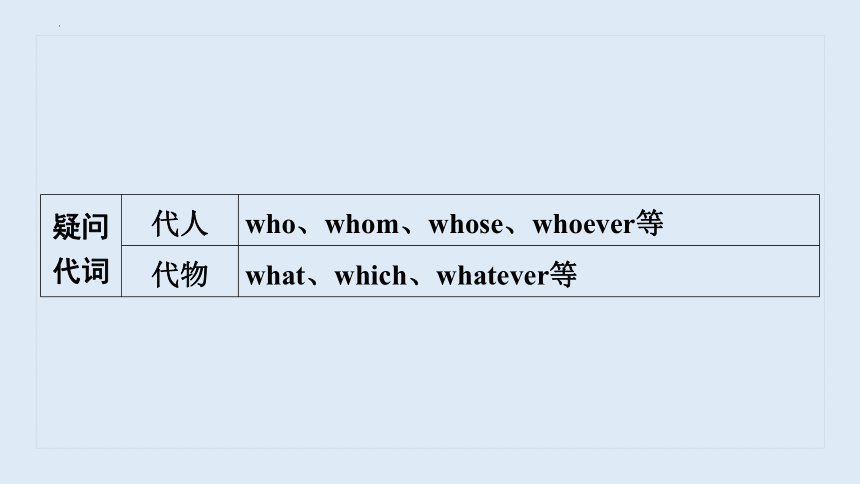
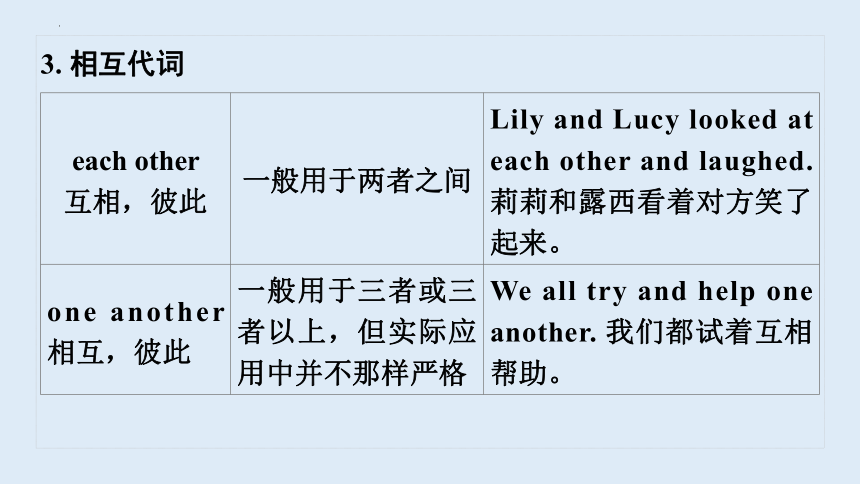
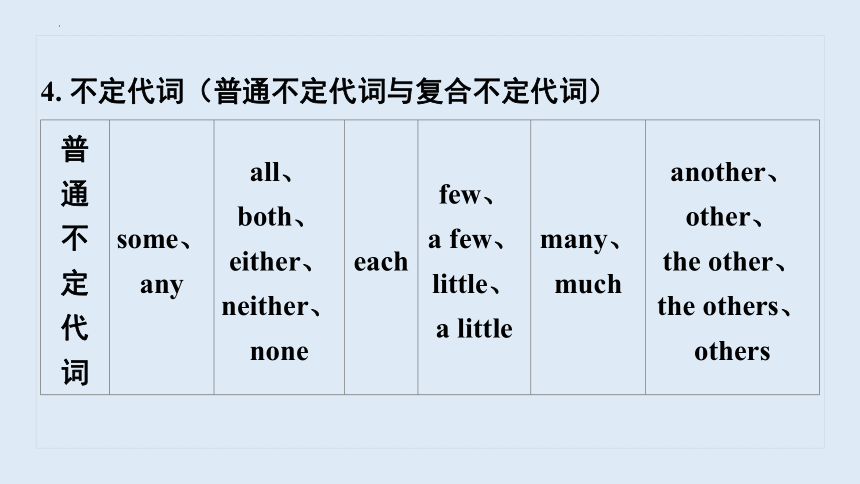
文档简介
(共33张PPT)
主题六 人际沟通
语法专项复习
一、代词
1. 人称代词、物主代词、反身代词
人称代词 物主代词 反身代词
主格 宾格 形容词性物主代词 名词性物主代词
I me my mine myself
you you your yours yourself
he him his his himself
she her her hers herself
人称代词 物主代词 反身代词
主格 宾格 形容词性物主代词 名词性物主代词
it it its its itself
we us our ours ourselves
you you your yours yourselves
they them their theirs themselves
续表
(1) 人称代词主格:作句子的主语。
例如:Lucy and Lily’s grandparents love collecting things. They have nine doorbells on their front door. 露西和莉莉的祖父母喜欢收集东西。他们的前门上有九个门铃。
(2) 人称代词宾格:作动词或介词的宾语。
例如:Lucy saw a silver doorbell. She rang it gently. 露西看见一个银色的门铃。她轻轻地按了一下。
(3) 物主代词:形容词性物主代词后面需要加名词,名词性物主代词后面不需要。
主语 + 谓语 形容词性物主代词 名词 主语 + 谓语 名词性物主代词
This is my book This book is mine
your yours
our ours
their theirs
his/her his/hers
(4) 反身代词:常用作宾语或同位语。
例如:I teach myself English.(宾语)我自学英语。
I learn English by myself.(宾语)我自学英语。
The headmaster himself will teach us English.(同位语)校长将亲自教我们英语。
2. 指示代词、疑问代词
指示代词 指代上文出现的名词 this、these、that、those
指示代词 用来指示或标识人或事物 单数 this这个 that那个
复数 these这些 those那些
注: it:特指上下文提到的对象是同一事物(同类同物);当说话人对所涉及的人的身份、姓名不清楚时,常用it代替。 one:泛指上下文提及的同类事物中的单数,同类而不同物(同类异物)。复数用ones。
疑问代词 代人 who、whom、whose、whoever等
代物 what、which、whatever等
3. 相互代词
each other 互相,彼此 一般用于两者之间 Lily and Lucy looked at each other and laughed. 莉莉和露西看着对方笑了起来。
one another 相互,彼此 一般用于三者或三者以上,但实际应用中并不那样严格 We all try and help one another. 我们都试着互相帮助。
4. 不定代词(普通不定代词与复合不定代词)
普通不定代词 some、 any all、both、either、neither、none each few、 a few、 little、 a little many、 much another、other、
the other、
the others、others
词汇 含义及用法 例句
other 别的,其他的(人或物),与可数名词复数连用 We learn English, Chinese, math and other subjects. 我们学习英语、语文、数学以及其他科目。
others 泛指别的,其他人,相当于other + 可数名词复数,常用结构some ... others ... In our class, some students love music, while others enjoy reading. 我们班一些同学喜欢音乐,其余的人喜欢阅读。
词汇 含义及用法 例句
the other 两者中的另一个,常用于one ... the other ... 句型中 There are two coins. One is mine, and the other is for you. 这儿有两枚硬币,一枚是我的,另一枚是给你的。
the others 特指某一范围内的“其他人或物”,只作代词用,相当于 the other + 名词复数 There are three coins. One is mine, and the others are for you. 这儿有三枚硬币,一枚是我的,剩下的两枚是给你的。
续表
词汇 含义及用法 例句
another 三个或三个以上的另一个,表泛指另一个或多个,既可作代词也可作限定词 The cake is delicious! Can I have another piece? 这蛋糕很美味,我能不能再吃一块?
I don’t like this one. Please show me another. 我不喜欢这一个,请给我看看另一个。
Another three boys will help us. 另外三个男孩会来帮助我们。
续表
用法:
(1) 使用some和any来表示数量。some常用在肯定句中,any常用在否定句和疑问句中。
(2) 如果期待得到对方肯定的回答,疑问句中也使用some。
复合不定代词 every- some- any- no-
-body everybody somebody anybody nobody
-one everyone someone anyone no one
-thing everything something anything nothing
用法:
(1) 不定代词作主语,谓语动词用第三人称单数。
例如:Everything is OK. 一切都很好。
(2) 形容词修饰不定代词要后置。
例如:I can find something interesting while reading. 我在阅读的时候能发现一些有趣的东西。
5. 关系代词(引导定语从句)
在定语从句中,who用来指人;which用来指物;that既可用来指人,也可用来指物。
6. 连接代词(引导从句的疑问代词)
宾语从句可由连接代词who、whom、whose、what、which、whoever、whatever等引导。
二、被动语态
1. 各种时态的主动和被动语态(以do为例)
时态 主动语态 被动语态
一般现在时 do/does am/is/are + done
一般过去时 did was/were + done
一般将来时 will/shall + do am/is/are going to + do will/shall be + done
am/is/are going to + be + done
时态 主动语态 被动语态
现在进行时 am/is/are + doing am/is/are + being + done
过去进行时 was/were + doing was/were + being + done
现在完成时 have/has + done have/has + been + done
过去完成时 had + done had + been + done
续表
注:情态动词的被动语态——情态动词 + be + done。
2. 主动语态变被动语态
3. 被动语态的注意事项
(1) 某些系动词如 smell、 look、 sound、 feel、 seem、 taste等,用主动表被动。
例如:The dress on you looks very beautiful. 你穿的这条裙
子很好看。
(2) 不及物动词如rise、 happen、 succeed等,无被动语态。
例如:The sun rises as usual. 太阳照常升起。
(3) write、 read、 clean、 sell、 wash、 cook 等,常用主动表被动。
例如:The cloth washes easily. 这种布料很容易清洗。
The new product sells well. 这款新产品很畅销。
用所给词的适当形式填空
1. The girl who is in blue and has long hair is a friend of mine (I).
2. — It’s raining cats and dogs outside, but I don’t have an
umbrella.
— Don’t worry. You can share mine (I).
mine
mine
3. I always remember to be a gentleman, like holding the door open for the person behind me (I).
4. After climbing to the top of the mountain, Steven finally understood the importance of teamwork. Without his friends’ help, he couldn’t do that by himself (he).
5. As for making friends, the students who are more outgoing are more welcomed than those (that)who are not.
me
himself
those
6. Teenagers are encouraged (encourage) to take part in more social activities.
7. Everyone has arrived except Eric. He says he will come to the party if his homework is finished (finish).
8. Everyone was asked (ask) to turn off their mobile phones before the meeting started.
are encouraged
is finished
was asked
9. I hear that a new cartoon film about friendship will be shown (show) next week. I want to watch it with my friend Linda.
10. As we all know, the social media App is a kind of useful invention which is used (use) to help people chat with friends, share ideas and feelings freely.
will be
is used
shown
同义句转换
1. Was a birthday card sent to you by Tom yesterday?(变为主动语态)
Did Tom send you a birthday card yesterday?
2. We should teach our students some skills about interpersonal communication. (变为被动语态)
Our students should be taught some skills about interpersonal communication.
Did Tom
be taught
3. We will hold a class meeting to talk about teamwork next Monday. (变为被动语态)
A class meeting will be held to talk about teamwork next Monday.
4. I invited Mr. Green to sing an English song at the party and he sang well.(变为被动语态)
Mr. Green was invited to sing an English song at the party and he sang well.
will be held
was invited
5. Mary looked very nervous when she was introduced to the famous scientist.(变为主动语态)
Mary looked very nervous when I introduced her to the famous scientist.
introduced her
词语运用
we they grow thing friend someone
live this wise make punish everyone
Young people and older people don’t always agree with each other. 1. They sometimes have different opinions about living, working and having fun.
They
But in one special program in New York, adults and teenagers live together and influence each other in a 2. friendly way. 200 teenagers and 50 adults live together for eight weeks as a group. 3. Everyone works for several hours each day. Lots of vegetables and fruit 4. are grown on the farms, including carrots, tomatoes and apples. Teenagers learn to repair
5. things like tables and chairs with the help of the adults.
friendly
Everyone
are grown
things
we they grow thing friend someone
live this wise make punish everyone
When people live together, rules are always necessary. In
6. this program, the teenagers and the adults make the rules together. Also, an agreement 7. is made to decide everything together. If someone breaks a rule, the whole group 8. will be punished . Sometimes, teenagers have a quicker mind, but adults are 9. wiser than teenagers in solving problems.
this
is made
will be punished
wiser
we they grow thing friend someone
live this wise make punish everyone
One of the teenagers says about the experience at the end of the eighth week, “We don’t only think about 10. ourselves . We learn to think about the whole group.”
ourselves
we they grow thing friend someone
live this wise make punish everyone
主题六 人际沟通
语法专项复习
一、代词
1. 人称代词、物主代词、反身代词
人称代词 物主代词 反身代词
主格 宾格 形容词性物主代词 名词性物主代词
I me my mine myself
you you your yours yourself
he him his his himself
she her her hers herself
人称代词 物主代词 反身代词
主格 宾格 形容词性物主代词 名词性物主代词
it it its its itself
we us our ours ourselves
you you your yours yourselves
they them their theirs themselves
续表
(1) 人称代词主格:作句子的主语。
例如:Lucy and Lily’s grandparents love collecting things. They have nine doorbells on their front door. 露西和莉莉的祖父母喜欢收集东西。他们的前门上有九个门铃。
(2) 人称代词宾格:作动词或介词的宾语。
例如:Lucy saw a silver doorbell. She rang it gently. 露西看见一个银色的门铃。她轻轻地按了一下。
(3) 物主代词:形容词性物主代词后面需要加名词,名词性物主代词后面不需要。
主语 + 谓语 形容词性物主代词 名词 主语 + 谓语 名词性物主代词
This is my book This book is mine
your yours
our ours
their theirs
his/her his/hers
(4) 反身代词:常用作宾语或同位语。
例如:I teach myself English.(宾语)我自学英语。
I learn English by myself.(宾语)我自学英语。
The headmaster himself will teach us English.(同位语)校长将亲自教我们英语。
2. 指示代词、疑问代词
指示代词 指代上文出现的名词 this、these、that、those
指示代词 用来指示或标识人或事物 单数 this这个 that那个
复数 these这些 those那些
注: it:特指上下文提到的对象是同一事物(同类同物);当说话人对所涉及的人的身份、姓名不清楚时,常用it代替。 one:泛指上下文提及的同类事物中的单数,同类而不同物(同类异物)。复数用ones。
疑问代词 代人 who、whom、whose、whoever等
代物 what、which、whatever等
3. 相互代词
each other 互相,彼此 一般用于两者之间 Lily and Lucy looked at each other and laughed. 莉莉和露西看着对方笑了起来。
one another 相互,彼此 一般用于三者或三者以上,但实际应用中并不那样严格 We all try and help one another. 我们都试着互相帮助。
4. 不定代词(普通不定代词与复合不定代词)
普通不定代词 some、 any all、both、either、neither、none each few、 a few、 little、 a little many、 much another、other、
the other、
the others、others
词汇 含义及用法 例句
other 别的,其他的(人或物),与可数名词复数连用 We learn English, Chinese, math and other subjects. 我们学习英语、语文、数学以及其他科目。
others 泛指别的,其他人,相当于other + 可数名词复数,常用结构some ... others ... In our class, some students love music, while others enjoy reading. 我们班一些同学喜欢音乐,其余的人喜欢阅读。
词汇 含义及用法 例句
the other 两者中的另一个,常用于one ... the other ... 句型中 There are two coins. One is mine, and the other is for you. 这儿有两枚硬币,一枚是我的,另一枚是给你的。
the others 特指某一范围内的“其他人或物”,只作代词用,相当于 the other + 名词复数 There are three coins. One is mine, and the others are for you. 这儿有三枚硬币,一枚是我的,剩下的两枚是给你的。
续表
词汇 含义及用法 例句
another 三个或三个以上的另一个,表泛指另一个或多个,既可作代词也可作限定词 The cake is delicious! Can I have another piece? 这蛋糕很美味,我能不能再吃一块?
I don’t like this one. Please show me another. 我不喜欢这一个,请给我看看另一个。
Another three boys will help us. 另外三个男孩会来帮助我们。
续表
用法:
(1) 使用some和any来表示数量。some常用在肯定句中,any常用在否定句和疑问句中。
(2) 如果期待得到对方肯定的回答,疑问句中也使用some。
复合不定代词 every- some- any- no-
-body everybody somebody anybody nobody
-one everyone someone anyone no one
-thing everything something anything nothing
用法:
(1) 不定代词作主语,谓语动词用第三人称单数。
例如:Everything is OK. 一切都很好。
(2) 形容词修饰不定代词要后置。
例如:I can find something interesting while reading. 我在阅读的时候能发现一些有趣的东西。
5. 关系代词(引导定语从句)
在定语从句中,who用来指人;which用来指物;that既可用来指人,也可用来指物。
6. 连接代词(引导从句的疑问代词)
宾语从句可由连接代词who、whom、whose、what、which、whoever、whatever等引导。
二、被动语态
1. 各种时态的主动和被动语态(以do为例)
时态 主动语态 被动语态
一般现在时 do/does am/is/are + done
一般过去时 did was/were + done
一般将来时 will/shall + do am/is/are going to + do will/shall be + done
am/is/are going to + be + done
时态 主动语态 被动语态
现在进行时 am/is/are + doing am/is/are + being + done
过去进行时 was/were + doing was/were + being + done
现在完成时 have/has + done have/has + been + done
过去完成时 had + done had + been + done
续表
注:情态动词的被动语态——情态动词 + be + done。
2. 主动语态变被动语态
3. 被动语态的注意事项
(1) 某些系动词如 smell、 look、 sound、 feel、 seem、 taste等,用主动表被动。
例如:The dress on you looks very beautiful. 你穿的这条裙
子很好看。
(2) 不及物动词如rise、 happen、 succeed等,无被动语态。
例如:The sun rises as usual. 太阳照常升起。
(3) write、 read、 clean、 sell、 wash、 cook 等,常用主动表被动。
例如:The cloth washes easily. 这种布料很容易清洗。
The new product sells well. 这款新产品很畅销。
用所给词的适当形式填空
1. The girl who is in blue and has long hair is a friend of mine (I).
2. — It’s raining cats and dogs outside, but I don’t have an
umbrella.
— Don’t worry. You can share mine (I).
mine
mine
3. I always remember to be a gentleman, like holding the door open for the person behind me (I).
4. After climbing to the top of the mountain, Steven finally understood the importance of teamwork. Without his friends’ help, he couldn’t do that by himself (he).
5. As for making friends, the students who are more outgoing are more welcomed than those (that)who are not.
me
himself
those
6. Teenagers are encouraged (encourage) to take part in more social activities.
7. Everyone has arrived except Eric. He says he will come to the party if his homework is finished (finish).
8. Everyone was asked (ask) to turn off their mobile phones before the meeting started.
are encouraged
is finished
was asked
9. I hear that a new cartoon film about friendship will be shown (show) next week. I want to watch it with my friend Linda.
10. As we all know, the social media App is a kind of useful invention which is used (use) to help people chat with friends, share ideas and feelings freely.
will be
is used
shown
同义句转换
1. Was a birthday card sent to you by Tom yesterday?(变为主动语态)
Did Tom send you a birthday card yesterday?
2. We should teach our students some skills about interpersonal communication. (变为被动语态)
Our students should be taught some skills about interpersonal communication.
Did Tom
be taught
3. We will hold a class meeting to talk about teamwork next Monday. (变为被动语态)
A class meeting will be held to talk about teamwork next Monday.
4. I invited Mr. Green to sing an English song at the party and he sang well.(变为被动语态)
Mr. Green was invited to sing an English song at the party and he sang well.
will be held
was invited
5. Mary looked very nervous when she was introduced to the famous scientist.(变为主动语态)
Mary looked very nervous when I introduced her to the famous scientist.
introduced her
词语运用
we they grow thing friend someone
live this wise make punish everyone
Young people and older people don’t always agree with each other. 1. They sometimes have different opinions about living, working and having fun.
They
But in one special program in New York, adults and teenagers live together and influence each other in a 2. friendly way. 200 teenagers and 50 adults live together for eight weeks as a group. 3. Everyone works for several hours each day. Lots of vegetables and fruit 4. are grown on the farms, including carrots, tomatoes and apples. Teenagers learn to repair
5. things like tables and chairs with the help of the adults.
friendly
Everyone
are grown
things
we they grow thing friend someone
live this wise make punish everyone
When people live together, rules are always necessary. In
6. this program, the teenagers and the adults make the rules together. Also, an agreement 7. is made to decide everything together. If someone breaks a rule, the whole group 8. will be punished . Sometimes, teenagers have a quicker mind, but adults are 9. wiser than teenagers in solving problems.
this
is made
will be punished
wiser
we they grow thing friend someone
live this wise make punish everyone
One of the teenagers says about the experience at the end of the eighth week, “We don’t only think about 10. ourselves . We learn to think about the whole group.”
ourselves
we they grow thing friend someone
live this wise make punish everyone
同课章节目录
- 词法
- 名词
- 动词和动词短语
- 动词语态
- 动词时态
- 助动词和情态动词
- 非谓语动词
- 冠词
- 代词
- 数词和量词
- 形容词副词及其比较等级
- 介词和介词短语
- 连词和感叹词
- 构词法
- 相似、相近词比较
- 句法
- 陈述句
- 一般疑问句和否定疑问句
- 特殊疑问句及选择疑问句
- 反意疑问句
- 存在句(There be句型)
- 宾语从句
- 定语从句
- 状语从句
- 主谓一致问题
- 简单句
- 并列句
- 复合句
- 主谓一致
- 主、表语从句
- 名词性从句
- 直接引语和间接引语
- 虚拟语气
- 感叹句
- 强调句
- 倒装句
- 祈使句
- 句子的成分
- 句子的分类
- 题型专区
- 单项选择部分
- 易错题
- 完形填空
- 阅读理解
- 词汇练习
- 听说训练
- 句型转换
- 补全对话
- 短文改错
- 翻译
- 书面表达
- 任务型阅读
- 语法填空
- 其他资料
